
The Army of the Republic of North Macedonia, formerly Army of the Republic of Macedonia (ARM), is the regular armed force of North Macedonia. The army is organized, prepared and trained for conducting armed struggle and combat and other actions for the realization of its constitutional function for the defense of the Republic, i.e. defense of the independence and territorial integrity of the Republic. The army consists of the ground forces and the air force, which are further divided into branches and services. The army has a permanent composition and reserve forces. Since 2005, it is a fully professional defense force compatible with NATO standards.

The North Atlantic Treaty Organization, also called the North Atlantic Alliance, is an intergovernmental military alliance between 31 member states – 29 European and two North American. Established in the aftermath of World War II, the organization implemented the North Atlantic Treaty, signed in Washington, D.C., on 4 April 1949. NATO is a collective security system: its independent member states agree to defend each other against attacks by third parties. During the Cold War, NATO operated as a check on the threat posed by the Soviet Union. The alliance remained in place after the dissolution of the Soviet Union and the Warsaw Pact, and has been involved in military operations in the Balkans, the Middle East, South Asia, and Africa. The organization's motto is animus in consulendo liber.
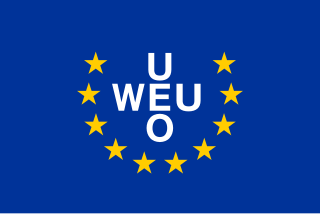
The Western European Union was the international organisation and military alliance that succeeded the Western Union (WU) after the 1954 amendment of the 1948 Treaty of Brussels. The WEU implemented the Modified Brussels Treaty. During the Cold War, the Western Bloc included the WEU member states and the United States and Canada as part of the North Atlantic Treaty Organization (NATO).

The Albanian Armed Forces are the military of Albania and were formed after the declaration of independence in 1912. Today, it consists of the General Staff, the Albanian Land Force, Albanian Air Force and the Albanian Naval Force.
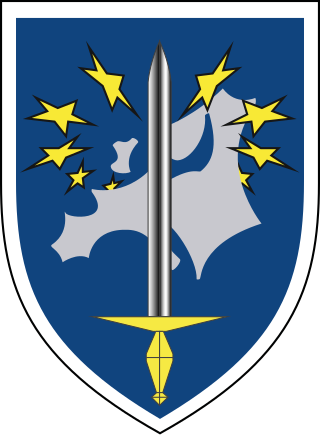
Eurocorps, located in the French city of Strasbourg (Bas-Rhin), is a multinational corps headquarters. Founded by France and Germany in 1992, it is today composed of personnel from six framework nations and five associated nations. The framework nations place the Eurocorps at the service of the European Union (EU) and NATO, which certified it in 2002 as one of its nine High Readiness Land Headquarters.

The Kosovo Force (KFOR) is a NATO-led international peacekeeping force in Kosovo. Its operations are gradually reducing until Kosovo's Security Force, established in 2009, becomes self sufficient.
The Allied Rapid Reaction Corps (ARRC) is a rapid reaction force maintained by NATO. It is capable of deploying a High Readiness Force (Land) Headquarters at short notice for operations and crisis response.
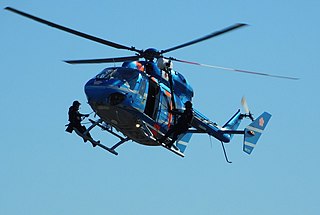
A rapid reaction force (RRF) is a military or police unit capable of responding to emergencies in a very short time frame. When used in reference to law enforcement and security forces, such as police tactical units, the time frame is usually minutes, while in military applications, such as paratroopers or commandos, the time frame can be hours to days.

The Common Security and Defence Policy (CSDP) is the European Union's (EU) course of action in the fields of defence and crisis management, and a main component of the EU's Common Foreign and Security Policy (CFSP).

An EU Battlegroup is a military unit adhering to the Common Security and Defence Policy (CSDP) of the European Union (EU). Often based on contributions from a coalition of member states, each of the eighteen Battlegroups consists of a battalion-sized force reinforced with combat support elements. Two of the battlegroups were declared to be capable of being assembled for operational deployment at any one time.
An international decoration is a military award which is not bestowed by a particular country, but rather by an international organization such as the United Nations or NATO. Such awards are normally issued as service medals, for participation in various international military operations, and not for specific acts of heroism or bravery.

The Petersberg Declaration was adopted by ministers of the Western European Union on 19 June 1992 at Hotel Petersberg, near Bonn in Germany. It defined military tasks of a humanitarian, disarming, peacekeeping and peacemaking nature that the WEU would be empowered to do. The contents and responsibilities arising from the declaration, known as the Petersberg Tasks, were later transferred to the European Union's (EU) European Security and Defence Policy (ESDP), presently known as the Common Security and Defence Policy (CSDP).
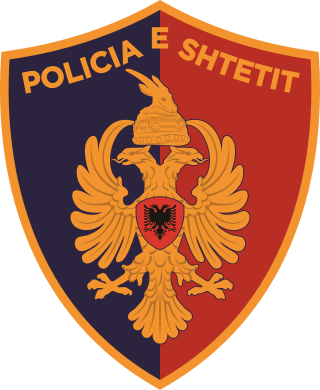
The Albanian State Police is the national police and law enforcement agency which operates throughout the Republic of Albania. The collapse of the Communist system and the establishment of political pluralism post-1991 brought important changes to the structure of the Albanian Police. The Ministry of Public Order and the General Directorate of Police were established in April 1991, and the new law of July 1991 established the Public Order Police. Nearly 80% of police manpower, i.e. personnel who had served under the previous system, were replaced by new recruits. On 4 November 1991, the Albanian Police was accepted as a member of Interpol. The emergency number is 129.
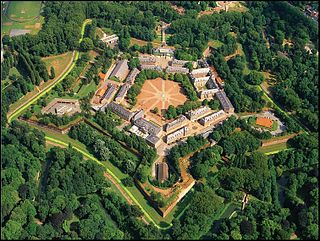
The Rapid Reaction Corps — France (RRC-FR) was created on 1 July 2005 by the French Army. It is NATO certified and declared capable of commanding a national or multinational land component of between 5,000 and 60,000 personnel. Plans call for the corps to command forces under French, EU or NATO command. It is subordinated to the French Army's Land Forces Command (CFT).
I. German/Dutch Corps (1GNC) is a multinational formation consisting of units from both the Royal Netherlands Army and German Army. The corps' headquarters also takes part in NATO Response Force readiness rotations. It is situated in Münster, formerly the headquarters of the German Army's I. Corps out of which I. German/Dutch Corps evolved. The corps has national and multinational operational responsibilities.

The Kosovo Security Force is the military of Kosovo. KSF is tasked with defending the sovereignty and territorial integrity of Kosovo, military support for civil authorities, and participation in international peacekeeping missions and operations. Since 2018, it is in the process of transforming into the Kosovo Armed Forces, a process that is expected to take 10 years.
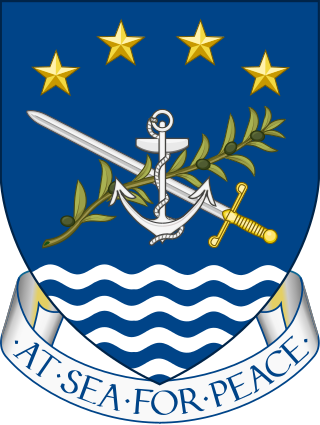
The European Maritime Force is a non-standing, military force with the current participation of France, Italy, Portugal, and Spain. The force may carry out naval, air and amphibious operations, with an activation time of 5 days after an order is received.

This article outlines the history of the Common Security and Defence Policy (CSDP) of the European Union (EU), a part of the Common Foreign and Security Policy (CFSP).

This article outlines the defence forces of the European Union (EU), which implement the EU's Common Security and Defence Policy (CSDP) in CSDP missions. There are two categories of EU multinational forces: ones that have been established intergovernmentally and made available to the CSDP through article 42.3 of the Treaty on European Union (TEU), such as the Eurocorps; and the EU Battlegroups, established at the EU level.

The European Union (EU) and the North Atlantic Treaty Organisation (NATO) are two main treaty-based Western organisations for cooperation between member states, both headquartered in Brussels, Belgium. Their natures are different and they operate in different spheres: NATO is a purely intergovernmental organisation functioning as a military alliance whose primary task is to implement article 5 in the North Atlantic Treaty on collective territorial defence. The EU on the other hand is a partly supranational and partly intergovernmental sui generis entity akin to a confederation that entails wider economic and political integration. Unlike NATO, the EU pursues a foreign policy in its own right—based on consensus, and member states have equipped it with tools in the field of defence and crisis management; the Common Security and Defence Policy (CSDP) structure.

















